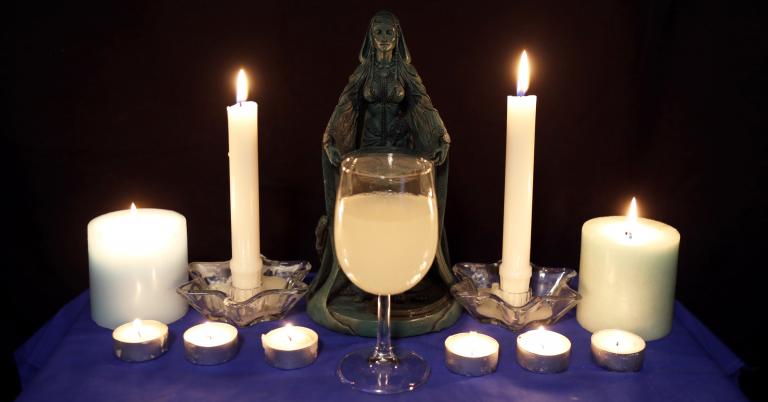Of the 8 Important Events and Trends in Paganism in 2020 the one that got the most feedback – by far – was #8: the decline of devotion.
A few people were surprised. They’ve kept doing their devotions and hadn’t noticed that people weren’t writing much about them. Several offered explanations – I think they all have a piece of the puzzle. Many simply expressed sadness and wondered what we can do about it. My response was this:
All I can do – and I’m starting to think, all anyone can do – is to do the devotion you’re called to do. And then write about it, in a “here’s what I’m doing” way (not in a “look at me – I’m so pious” way). And then either people will respond, or they won’t.
I’m going to try to do more of that this year. And I want to start here, with the realization that sometimes devotion gets stale. Sometimes our devotion needs a reboot.
Devotion is forming and maintaining sacred relationships
If you’re a regular reader this isn’t news to you. But for the benefit of those who just found this blog, I need to be clear that devotion isn’t something we do just because we’re told to do it. It has a purpose, and it has benefits.
The purpose of devotion is to help us form and maintain relationships with our Gods, our ancestors, the spirits of the places where we live, and other spiritual persons. We know from our this-world relationships that if you ignore people, eventually they go away. We don’t want our spiritual allies to go away. Devotion demonstrates a commitment to them and makes it far more likely that our relationships will grow and thrive.
Devotion to our Gods brings us closer to Them. It reminds us of Their virtues and values, which help us to become more God-like ourselves.
My three primary devotional practices
If you’re wondering how to start a devotional practice, read this post from 2016: Beginning a Devotional Practice. There are many ways to do devotion – these are my three primary practices.
Prayer is talking to the Gods. It can be carefully scripted or it can be spontaneous. It includes asking for what we need and giving thanks for what we receive. Prayer has always been a part of my life, but almost 10 years ago I started offering regular prayers four times each day. Prayer remains the cornerstone of my spiritual practice.
Meditation is listening for the Gods. If we call, They will usually answer. But those answers are rarely loud and dramatic. Most times they’re soft and subtle – they’re easy to miss if we aren’t paying attention. Meditation is hard for me, but I’ve made it a weekly practice for Cernunnos, the Morrigan, my ancestors, and another person I’m not allowed to name.
Offerings are how we practice good hospitality and reciprocity. I’m often asked “what’s a good offering for this particular deity?” Occasionally I’m told to make a specific offering, but most times it’s “I’ll have what you’re having.” Unless what I’m having is a whiskey I bought on someone else’s recommendation, didn’t really like, and I’m trying to drink it up. If you’re trying to get rid of it, it’s not an offering.
There are many other devotional practices – these are the three that are most important for me.
It’s OK if your devotion gets stale
Do you know what it means if your devotion gets stale? It means you’ve been doing devotion regularly and diligently even when you didn’t feel like doing it. And that’s a good thing.
I know people who say “if you can’t do it with enthusiasm don’t do it.” I strongly disagree.
If you’re a parent, you feed your kids every night. Sometimes you make an amazingly tasty and balanced meal. Sometimes you give them a sandwich and an apple. And sometime you give them McDonald’s drive-thru, because you’re exhausted and that’s all you can do. But you never don’t feed your kids.
Devotion is something we do whether we feel like it or not. One of the Top 10 Posts of 2020 was The Morrigan Demands Persistence Not Perfection. This is true of most deities, not just the Morrigan.
But just as it’s not good to give your kids McDonald’s drive-thru on a regular basis, neither is it good to go through the motions of devotion night after night, week after week, month after month.
So while it’s OK if your devotion gets stale, it’s not OK to let it stay stale.
Perform three special meditations
It’s tempting to tell yourself you just need to try harder. Or that everything will be OK when the pandemic is over and things get back to normal (we will never get back to “normal” – but that’s another post for another time). I encourage you to take the time to delve into the staleness and figure out what to do next.
The first meditation simply asks “why did you start your devotional practice?” Was it a mystical experience? A story that grabbed your attention? Curiosity about what might happen? Whatever it was, remember why you started, how you started, and what things were like when you did. This is a meditation, not an analysis – it’s OK if your answers are more images and feelings than hard reasons.
The second meditation asks “why did it get stale?” When the answer comes to you, ask “why did that happen?” Keep asking “why?” until you get past the surface reasons and into the deep reasons. When you get there, then ask “why else?” and start the process over again. There’s never one reason a spiritual practice grows stale. Keep digging until you find them all. But make sure you focus on what happened, not on blame. This isn’t about guilt. This is about figuring out what went wrong so you can do something different.
The third meditation asks “what do I do now?” Einstein didn’t say it, but if you keep doing the same things you’re likely to get the same results. “Try harder” is what you’ve been doing – it’s why your devotion is stale instead of non-existent. You need a different approach. Sit quietly (or walk outdoors, which works better for me) and listen until the answer or answers come to you.
It’s possible to do all three meditations one after the other, but it’s best if you do them on three consecutive nights. Do the meditation, make notes, clear your mind, sleep on it, then review your notes the next morning. What is unclear in meditation may become clear in dreams. Then do the next meditation that evening.
Mix up something
The easiest way to reboot something stale – devotional or otherwise – is to mix things up.
Have you been making offerings in the evenings? Make them at dawn instead. Praying at your altar? Go outside and pray. Stuck on red wine for the Morrigan? Try whiskey, or better yet, offer a portion of your dinner.
What if you can’t change what you’re doing? What if you’ve been told to perform specific devotions in specific ways, without fail? Then add something new. Make two offerings instead of one. Add a noon prayer to your evening meditation. While most deities are patient with beginners, they often become more demanding with intermediate and advanced practitioners. But I’ve never known any person – divine or otherwise – who got upset at receiving more devotion.
Plan and perform a ritual
Sometimes just breaking a stale routine isn’t enough. Sometimes you need a full restart. If that’s where you are, it’s time for a major ritual.
Do not try to wing this. Take the time to write a full script, whether you ultimately read the script, memorize the script, or use the script as an outline. Wear your good robe and jewelry, set an altar, light candles. Sometimes I say “it’s just me – I don’t need a bunch of ritual props.” For this ritual you do.
Use your full liturgy: cast a circle and call the quarters, if that’s what you do. Invite your spiritual allies to witness your rite. Acknowledge the good you’ve done in previous devotion, even if it’s incomplete, and even if your devotions have gone from stale to non-existent. This is not the place to “confess your sins” – you’ve done the best you could.
Say what you want, such as “I want my devotions to be full of life again.” Even if you didn’t do the best you could, you’re not asking for forgiveness – you’re beginning the process of doing better.
And then do it, as part of the ritual.
Pray. Find prayers of devotion that speak to you. If you can’t find ones you like, write your own. Make offerings – be generous, even extravagant. You can be extravagant with your Gods every so often. And then listen for Their response.
When it’s over, say what you will do going forward… and as always, do not promise what you cannot or will not do.
Pour yourself a drink (of whatever you’ve been offering, or just water) and share it with all those present. Then close the ritual in your normal method.
When I’ve done rituals like this I’ve done them alone. Doing them with other living humans adds witnesses, which adds an element of accountability. Either way will work – decide which is best for you.
Persistence is a virtue
The fact that you recognize your devotions have gotten stale is the first step toward revitalizing them. Stale devotion is better than no devotion, but so much more is possible.
Meditate on your devotions, how things got stale, and what you can go to reboot them. Mix things up. Perform a devotional ritual.
And then keep it up.
May your devotions draw you closer to your Gods and other spiritual allies in the coming year.




















